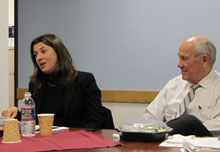AFP’s Daphne Benoit says military and media need mutual trust

March 9, 2010 — The military and the media have a “complex relationship,” said Daphne Benoit, Pentagon correspondent for Agence France Press (AFP), at a Shorenstein Center Speaker Series event. They need each other but have “conflicting interests.” The media values transparency, facts that can be verified and a quick turnaround of stories. The military, on the other hand, deals with classified information that sometimes can’t be verified, and it values order, discipline and a chain of command, which “is not exactly the media’s forte,” she said with a smile.
Benoit enumerated stereotypes of both the media and the military that can impede the communication of news. The media is often suspected of “breaching security, putting lives at risk by feeding the enemy with classified information, and undermining public support … by focusing on negative news.” When seen in this light, the media appears “ungrateful” for the risks the military takes to secure their safety. The military then is suspected of “hiding the truth” and “manipulating information to push their own interests.”
Yet beyond these stereotypes is the truth that the media needs the military for protection and “access to dangerous terrain,” and the military needs the media for the “public support that is so critical,” Benoit said. So both sides have taken actions to gain the other’s trust. Embedded reporters, for example, will often agree to certain rules that might limit their access to military information, but understand that “it’s part of the deal.”
In the military, Benoit said, “There is a real effort to communicate and offer access to get people to understand what they’re doing and why,” especially at the Pentagon, which is “probably the most open military building in the world.” Among many Pentagon officials, there is an understanding that if they continue to spin information, they will never build trust with the media, and “the dialogue will not be possible.”
Benoit provided guidelines for the media to be “as fair, balanced and credible as possible.” First, “We have to go see it for ourselves.” Being embedded with troops in Afghanistan was crucial in helping her understand what was going on in the war and gave her credibility with the military. “Always put [information] in context,” and avoid defining things only in terms of “the bad and the good guys. It’s more complicated than that.” “Remember the past,” she advised, and “always try to take into account different points of view from abroad.”
This article was written by Janell Sims and the photos were taken by Leighton Walter Kille, both of the Shorenstein Center.